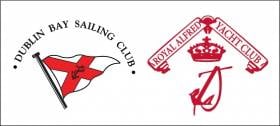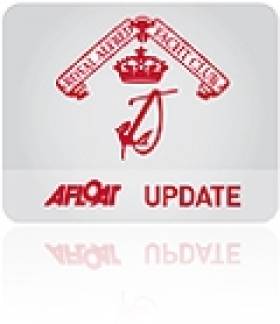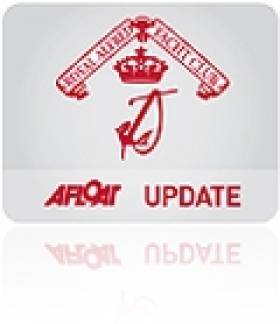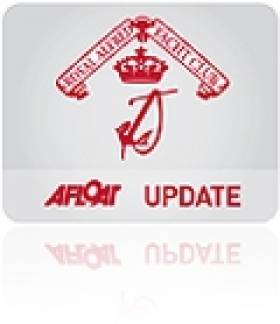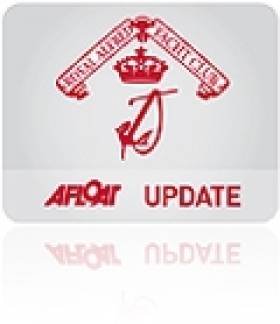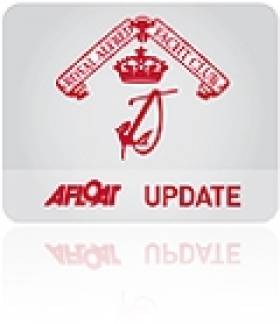Displaying items by tag: RAYC
The worst kept secret in Dublin sailing circles became public after a Royal Alfred Yacht Club EGM last night voted in favour of the motion 'that the Royal Alfred Yacht Club be incorporated into Dublin Bay Sailing Club'. The proposal was passed by an overwhelming majority of RAYC members present.
'Dublin Bay Sailing Club incorporating Royal Alfred Yacht Club' – Is This The New Name for Yacht Racing in the Capital?
There may well be a new name for yacht racing on Dublin Bay this season as merger talks between Dublin Bay Sailing Club (DBSC) and the Royal Alfred Yacht Club (RAYC) continue.
RAYC Flag Officers meet tonight in Dun Laoghaire to discuss the proposition of incorporating the historic club into the rival race organisation, DBSC.
According to an Afloat.ie source the proposals include a new name: 'Dublin Bay Sailing Club incorporating Royal Alfred Yacht Club' as well as the transfer of some historic yachting silvereware to the expanded DBSC. The RAYC will get a seat at the DBSC committee table to ensure the 'ethos' of the RAYC is preserved, according to the source. Two regattas per year will race under the RAYC burgee or its name at least and any RAYC monies left over after any wind up will be put towards an improved computerised results service for Dublin Bay racers.
As Afloat.ie reported previously the merger talks flagged for January come after years of deliberation.
Dublin Yacht Racing Clubs DBSC & RAYC To Discuss Merger in 2016
Two of Dublin's leading yacht racing clubs are in talks over a possible merger in order to rationalise a crowded Dublin Bay yacht racing calendar. Dublin Bay Sailing Club (DBSC) and the Royal Alfred Yacht Club (RAYC), whose origins date back to the late 1800s, have agreed to sit down and discuss the best way forward given the current 'very crowded calendar, reduced entries and duplication of effort that is impacting on both the RAYC and DBSC.
The link-up would modify the racing programmes of over 3,000 sailors and solve fixture clashes in the countries most popular race area.
At a Committee meeting of the Royal Alfred Yacht Club held last night it was agreed that the committee should enter into discussions with DBSC with a view to exploring and possibly rationalising the existing situation in Dublin Bay.
A small sub-committee was charged with investigating the options available to address these problems up to and including incorporation of the RAYC within DBSC. RAYC Commodore Barry MacNeaney said 'At all times being mindful of the necessity of preserving the unique heritage and tradition of the Royal Alfred'.
DBSC have indicated that they are open to discussion on this initiative and a meeting is scheduled to be held in early January with a view to having any agreement in place before the 2016 sailing season.
Similar talks have been held before with no real outcome. Thirteen years ago David O'Brien revealed merger talks in the Irish Times here
Tim Goodbody Is Afloat.ie 'Sailor Of The Month' For November
Veteran Royal Irish YC sailor Tim Goodbody is the Afloat.ie “Sailor of the Month” for November for his enormous contribution to Irish and international sailing over many decades, both as an active participants, as a race organiser, and as an administrator of leading sailing organisations.
By locating the award in November 2015, we highlight the fact that at the Dublin Bay SC Annual Prize-Giving on November 15th in the Royal St George YC, three generations of the Goodbody family received major awards. Grandson Max took The Mitchell Trophy in the RS Feva with granddaughter Georgia crewing, while son Richard - in partnership with Rick Johnson racing the International Dragon Diva - won the Oxford & Cambridge Cup, the Old Time Cup, and the RIYC Cup. And Tim himself, in his final season with the Sigma 33 White Mischief (he has now moved on to a J/109), won the J.B.Stephens Trophy, the Bective Lights Crystal Trophy, and the Fireseal Sigma 33 Trophy.
Both Tim and Richard were overall winners in their respective classes in the combined DBSC Thursday and Saturday season-long series. But while this shows the family’s devotion to Dublin Bay sailing, both White Mischief and Diva were also seen in major events at other venues, with White Mishchief taking second overall (by just two points) in Class 3 IRC at the ICRA Nats at Kinsale).
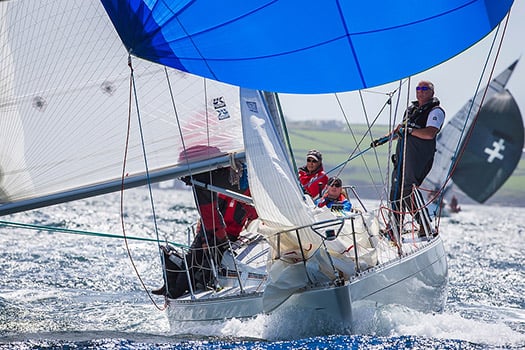
Although the Sigma 33 is not reckoned a favoured performer under IRC, Tim Goodbody still sailed White Mischief to a close second overall in IRC Class 3 at the ICRA Nats at Kinsale at the end of June. Photo: ICRA
The timing of the ICRA Nats at the end of June could just be fitted into Tim Goodbody’s busy schedule, for as Chairman of the Organising Committee for the Volvo Dun Laoghaire Regatta 2015 from July 9th to 12th, he was out of personal boat-racing for the next two weeks as the structures of the biggest sailing event in Ireland in many years swung successful into place, with the noted Goodbody light-but-effective management style keeping this very complex event moving smoothly forward to a happy conclusion.
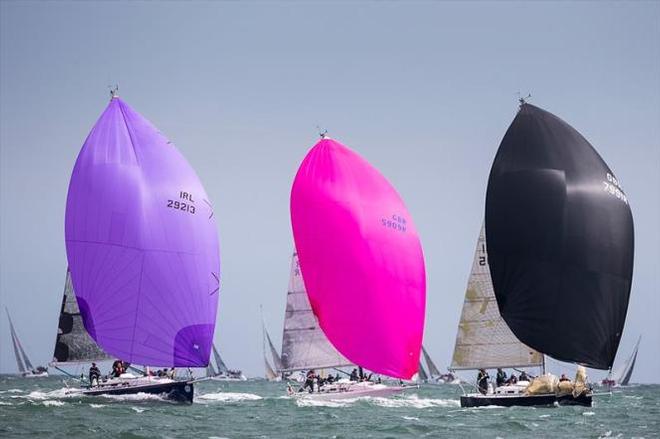
J/109s in full flight at the hugely successful Volvo Dun Laoghaire Regatta 2015, for which Tim Goodbody was Chairman of the Organising Committee. In 2016, he will himself be joining the J/109 class. Photo: VDLR
But then the depth of Tim Goodbody’s commitment to every aspect of sailing is unrivalled. He has campaigned successfully to international level in the Dragon, the J/24 and the Sigma 33, and as well he was lead helm on Irish Independent, the Dubois 40 which was the backbone of Ireland’s 1987 Admirals Cup team - our most successful AC squad ever, they placed fourth out of thirteen teams, while Irish Independent won the Fastnet Race overall.
Ashore, Tim Goodbody has served as Commodore of the Royal Irish YC, the Royal Alfred YC, and Dublin Bay SC, and for the latter organisation he was the mastermind behind the rationalization of the courses which enables an enormous fleet to race mostly in the southern half of Dublin Bay clear of the shipping lanes. His benefit to our sport is incalculable, but perhaps his greatest single contribution is the example he sets is in his own smoothly organised, quietly enthusiastic, very successful and highly enjoyable sailing.
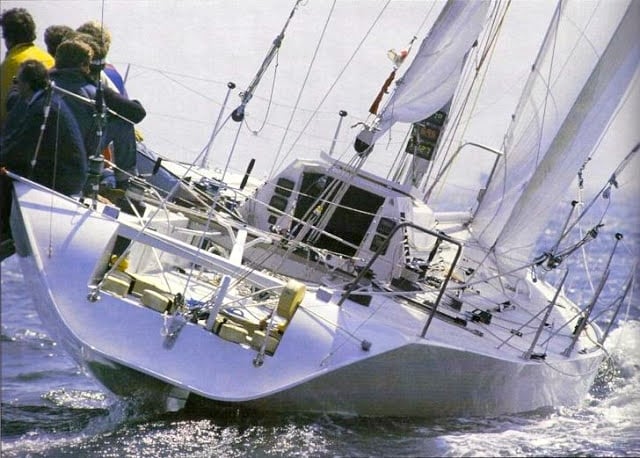 The Dubois 40ft Irish Independent racing in the Solent in the 1987 Admirals Cup. Somewhere in the middle of the tightly-packed crew is Tim Goodbody, and he is on the helm. During this series, he famously out-sailed the legendary Lawrie Smith on a sister-ship during a long tacking duel.
The Dubois 40ft Irish Independent racing in the Solent in the 1987 Admirals Cup. Somewhere in the middle of the tightly-packed crew is Tim Goodbody, and he is on the helm. During this series, he famously out-sailed the legendary Lawrie Smith on a sister-ship during a long tacking duel.
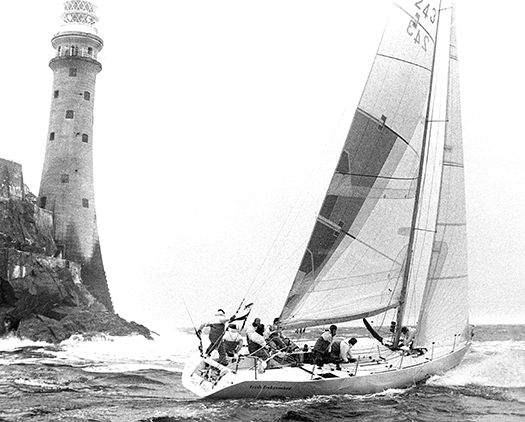 History is made. Irish Independent rounds the Fastnet Rock on Monday August 11th 1987, on her way to the overall win in the Fastnet Race.
History is made. Irish Independent rounds the Fastnet Rock on Monday August 11th 1987, on her way to the overall win in the Fastnet Race.
Royal Alfred Yacht Club Prizegiving 2015 Photos at Dun Laoghaire
Royal Alfred Yacht Club (RAYC) Bloomsday Regatta Results
#raycbloomsdayregatta – Paul Keane of the Royal Irish Yacht Club beat 17 Lasers for Bloomsday honours at the Royal Alfred Regatta on Dublin Bay yesterday. The results for all competing classes are available to download below as xcel files.
Royal Alfred Yacht Club AGM Hears Calls for Closer Co-operation With Other Dublin Bay Clubs
#rayc – There was a large turnout for this week's Royal Alfred Yacht Club (RAYC) agm with a number of interventions from the floor over a number of issues. Flag Officers and Honary Officers were elected as follows: Commodore Barry MacNeany; Vice Commodore Joe Carton; Treasurer Larry Power; Secretary Deborah Horan and Sailing Sec John Hayes. Committee Members are Brian Mathews, Brian Reddy, Chris Corrigan, Peter Beamish, Philip Dilworth and Irish ISAF International judge Gordon Davies.
There was no candidate for the post of Rear Commodore.
Attendance included a number of RAYC stalwarts inlcuding current Chairman of Volvo Dun Laoghaire Regatta, Tim Goodbody. Historian Hal Sisk, Norman Long and Ailbe Millerick were also there.
The meeting closed with a call to co–operate more closely with other clubs to mutualise some aspects of operations – insurance was one suggestion. Another intervention reminded the members of the longstanding tradition of innovation by the RAYC. It would be by continuing this tradition that the 'Alfred' would continue to develop and differentiate itself from other clubs. Each club has a specific contribution to sailing in Dublin Bay, the meeting heard.
Royal Alfred Yacht Club Toasts Winners At Annual Dinner in the Royal Irish Yacht Club
#rayc – The Royal Alfred Yacht Club held its Annual Black Tie Dinner and Prize-giving on Friday 21st November in the Royal Irish YC in Dun Laoghaire.
A packed dining room was treated to an excellent meal, fine wines and after the prizegiving a short presentation by Liam Coyne of his incredible Round Britain and Ireland odyssey in which he came first in the two-handed class and came sixth overall.
The Alfred's Trophies, some of which date back to the mid 1800s, were presented by Commodore Barry MacNeaney.
He paid tribute during his speech to the late, and much missed, Henry Robinson: he also toasted one of his distinguished guests Hal Bleakley who had announced his retirement from DBSC race officer duties at the end of the 2014 season.
The Royal Alfred is one of the very few Clubs to award crew prizes as well as those to the skipper – this for the Superleague.
And these prizes were very well received by the many crew who attended the dinner.
The success of the evening may be judged by the lateness of the hour that the last revellers left the Royal Irish!
Scroll down for prizewinners photos by Joe Fallon
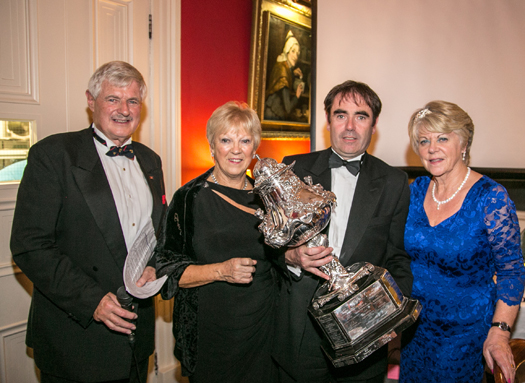
Barry MacNeaney , Carol MacNeaney, Nigel Biggs Winner Cruisers 2 and Deborah Horan

Carol MacNeaney, Joe Carton Vice Commodore RAYC, Mona Carton and Barry MacNeaney

Selection of RAYC trophies

Ben Shanahan winner Gold Fleet Lee Overlay Trophy for RAYC Coastal Series, Carol MacNeaney

Trina Owens, Carol MacNeaney and John Sugars winner Beneteau 31.7 Trophy

Tim Goodbody winner Sigma 33 "Princess Jalina" Trophy, Carol MacNeaney and Barry MacNeaney
Royal St. George Laser Sailor Wins Royal Alfred Liffey Challenge
#rayc – Despite a very gentle forecast of barely a few knots, 18 Lasers launched at Poolbeg Yacht and Boat Club and sailed up through the lifted toll bridge for Saturday's Royal Alfred fixture on the river Liffey. Once into the rectangular amphitheatre formed on the stretch up to the spectacular Samuel Beckett Bridge, the fleet were delighted to find a decent enough 5 to 8 knots blowing straight downstream. It was game on for the first ever Royal Alfred Yacht Club Laser Challenge with many spectators and supporters watching, on a truly glorious Autumn day in the capital.
Race Officer Barry MacNeaney and his team wasted no team and quickly got the races underway on, not surprisingly, a windward leeward course. Typically in Lasers there was a great spread of ages with plenty of interest in how a couple of hot young Radial helms would adapt to the Full rig. One of these, Luke Murphy, drew first blood with a great win in Race one. However, another Radial star Conor O'Beirne (2013 British 4.7 Champion) made his presence felt with the next bullet. Not many problems adapting so ! After a slowish start, Paul MacMahon struck back for the older fraternity and came through with the next two wins, before O'Beirne took the last race. After leading into the decider on points, this was more than enough to make the RStGYC Laser ace the first ever RAYC Laser King of the River O'Beirne took home the fine Royal Alfred Liffey Challenge Trophy which has been presented in previous years for 1720 and SB20 racing up in the heart of the city.
MacMahon took second overall and an improving Sean Craig popped out in 3rd overall, a couple of points ahead of Murphy who edged Theo Lyttle on the tie break. Other podium race results were posted by Ross O'Leary and Rob Cahill. Amanda Relph was first Radial and Daniel Hopkins was first 4.7.
Top 5 overall in largest 'Full Rig' division
1 Conor O'Beirne RStGYC 6 pts
2 Paul MacMahon HYC 9 pts
3 Sean Craig RStGYC 12 pts
4 Luke Murphy RStGYC 14 pts
5 Theo Lyttle RStGYC 14 pts
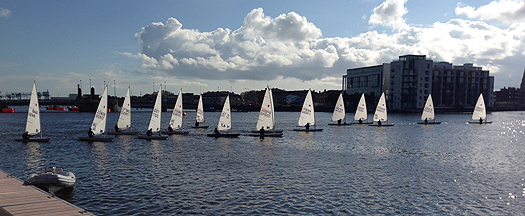
The Laser fleet were treated to great conditions on the river
A huge thanks to the Royal Alfred Yacht Club (especially Barry MacNeaney), the highly hospitable Poolbeg Yacht Club, RIB support Frank Heath and also to Richard Tate who managed to mobilise a great turnout. This was the first but almost definitely not the last RAYC Laser Liffey regatta...
Liffey Laser Regatta Attracts 18 For Royal Alfred YC Dinghy Event
#liffeylasers – If you thought all the Irish Laser action was in the south of France this week, you'd be wrong. Paul MacMahon (Strangford/Howth), a previous number one on the domestic full rig rankings, is among 18 Lasers now entered for the Saturday's Royal Alfred Laser Challenge on the River Liffey. Other competitors heading for the captial's waters are a mix of younger guys graduating up from the 'Radial' rig and some senior 'Masters' including Theo Lyttle, Rob Cahill and Sean Craig.
As previously reported, the East Link Toll bridge lifts at 1015 for the Lasers, racing (as many races as possible) from 1100, bridge back up at 1500, then Poolbeg YC for the prizegiving.



























